Anna Tereshkina
Facebook
March 21, 2018
I went to Viktor Filinkov’s court hearing, where his motion to have his remand in policy custody changed to house arrest was reviewed.
I arrived at the Dzerzhinsky District Courthouse by 10 a.m., already hungry although I had eaten breakfast. Outside the subway station, I bought a pasty and put it in my backpack.
It turned out there was no need to arrive fifteen minutes before the hearing was scheduled to begin, because they kept everyone stewing for over an hour before starting.
I was able to draw my girlfriends as they languished in the stuffy court building.
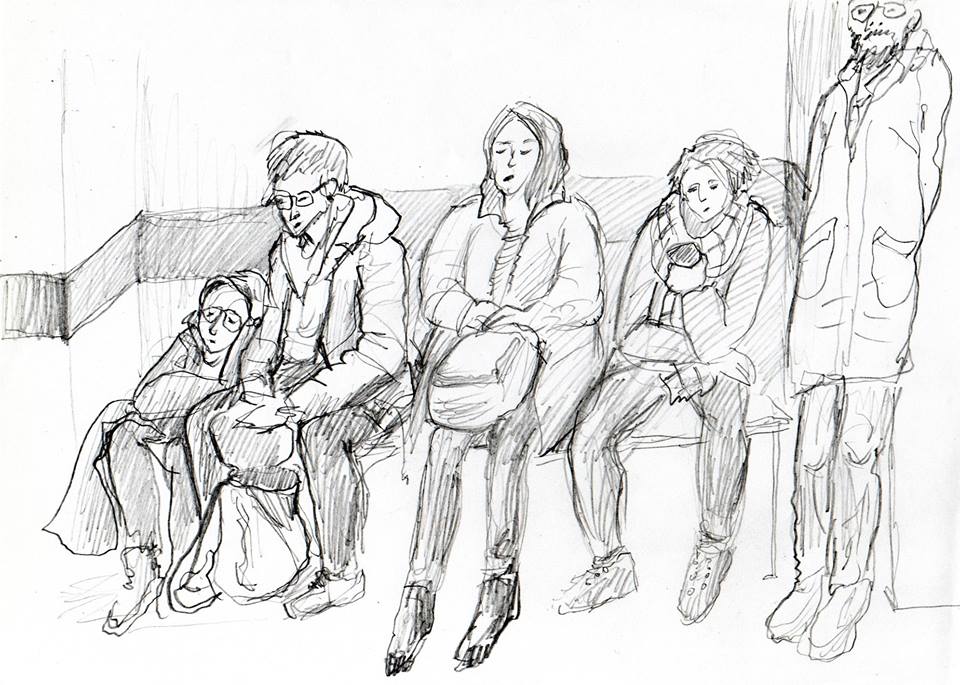
Then a tall, skinny court bailiff herded everyone to the end of the hallway. Viktor was brought in, and everyone raised their arms and focused the cameras on their smartphones. There was a round of applause.
I was somehow expecting a huge ovation, but then it hit me, mournfully, that there were not very many of us, something like fifteen to twenty people, I think. Or is that a lot? Or was every other person monkeying with his or her camera?
We were not let into the courtroom immediately.
Everything seemed quite dicey, as if at any minute they might never let us out of there.
My hands were shaking, so my only drawing of Viktor did not come out very legible.
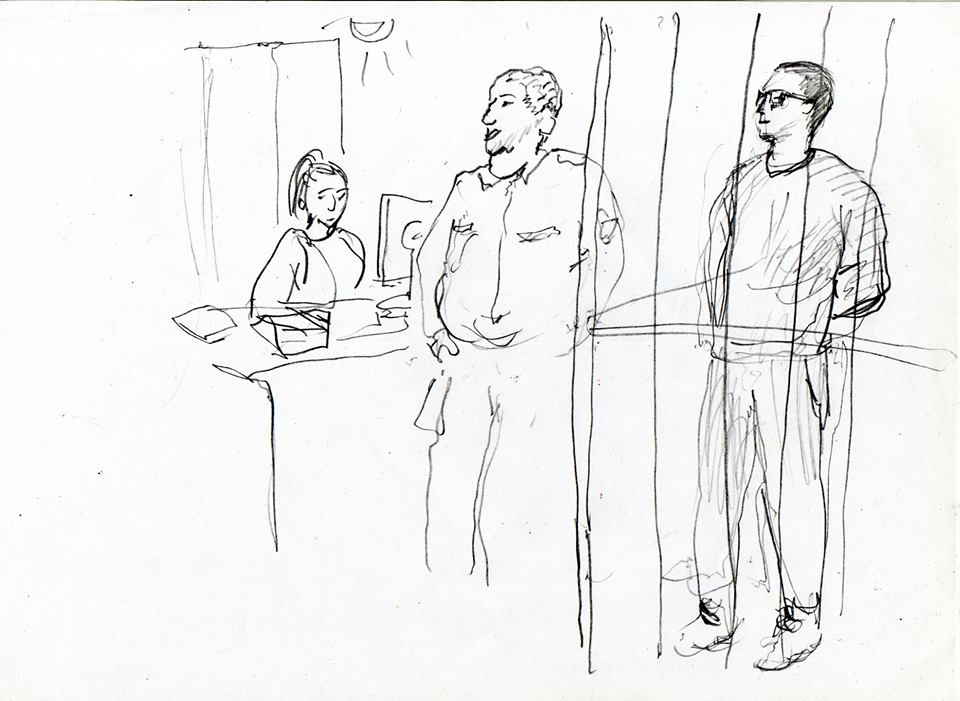
Viktor himself looked liked a man who had not lost hope.
I noticed his shoes were tied with strange laces. Were they fashioned from plastic bags, as he had described, or did someone give him white laces for the hearing?
The judge’s voice was unexpectedly kind and polite, like the voice of a school guidance counselor.
We were kicked out of the courtroom, of course, while the court deliberated whether to hold the hearing in chambers or not.
After waiting for an hour, I took out my pasty, which had gone cold.
The lanky bailiff was tormented. He would try and drive everyone away from the passage to the courtroom, the walls, and the doors. But the people who had come to the hearing reacted to him as if he were an annoying fly. The only thing that interested them were the big wooden doors and what has happening on the other side of them.

I sketched the bailiff, wondering whether he beat his wife and kids.
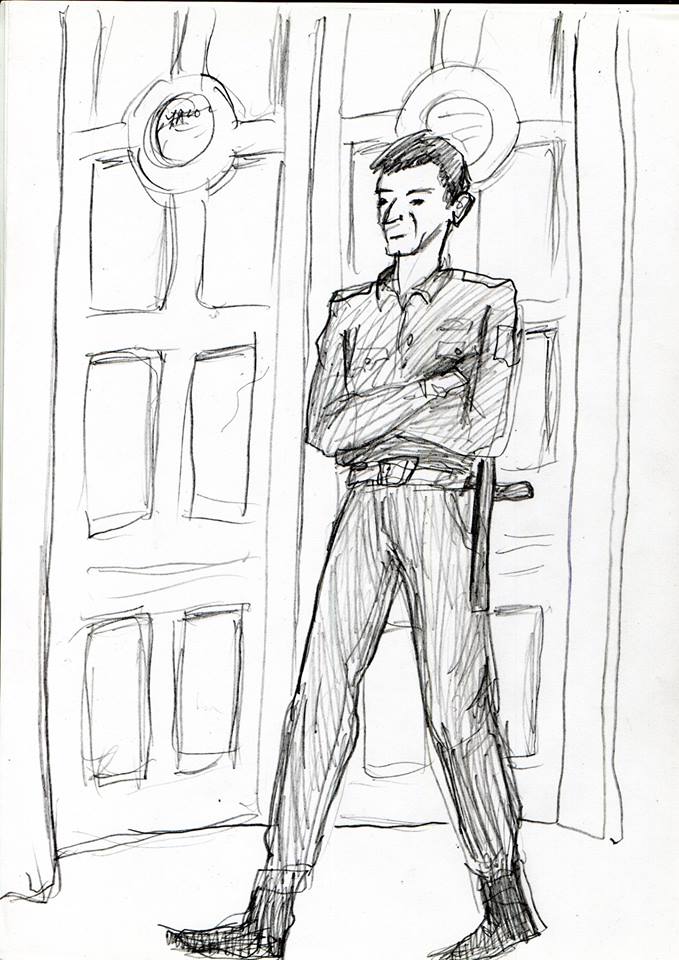
Finally, he called another bailiff, who had bangs and wore ordinary jeans instead of the trousers issued with his uniform. He stood by the door more calmly.
Suddenly, a fresh breeze wafted through the hallway. It was workers carrying furniture. Two massive wooden benches, a wardrobe, and a whole suite of judge’s thrones adorned with crests. One of them had no seat at all, as if its makers had wanted to use it as a toilet at the dacha.
The bailiff with the bangs got distracted and stepped away from the door. One of the workers immediately dashed to our coveted Courtroom No. 9, stuck his nose in the door, and loudly asked, “Can we bring in the wardrobe?”
A clerk in a gray dress came out and said they should wait until the hearing was over.
Yes, the hearing had long been underway, but we had not even been called into the courtroom and told the court had decided to hold the hearing in chambers.
People grumbled and wrote complaints.
Nastya showed me a book, The Suffering Middle Ages, which had a chapter about how, from the twelth to fourteenth centuries, law books were lavishly illustrated with giant penises.
The tall, nervous bailiff returned and once more herded everyone to the end of the hallway.
Viktor was brought out by the guards. The applause and shouts of support were louder than the first time.
The court had again recessed for deliberation. The workers finished their unloading, and stuffiness again reigned in the hallway. Someone brought juice, biscuits, and bananas.
The bailiff with the bangs immediately popped up, saying it was forbidden to eat in the courthouse. He was probably the hungriest of us all.
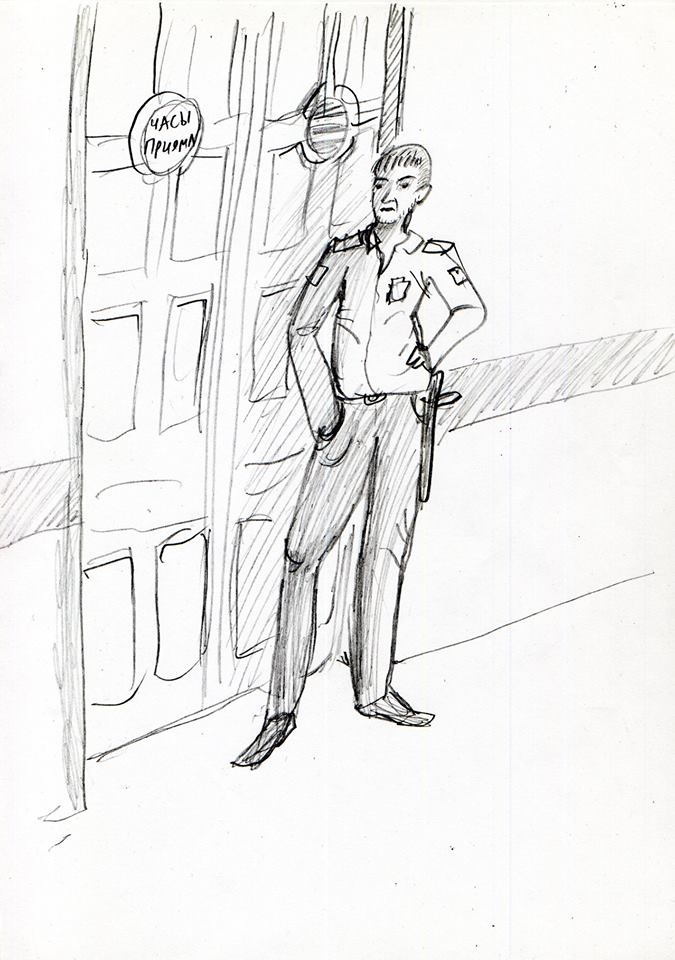
For five minutes or so, no one did, in fact, eat anything, but then we passed around the biscuits, divvied up the bananas, and poured the juice into cups. The bailiff didn not feel like reminding us again, apparently, and he said nothing.
Viktor’s defense attorney Vitaly Cherkasov came out and said we would have to wait for at least another hour. We had been sitting there for four hours as it was.
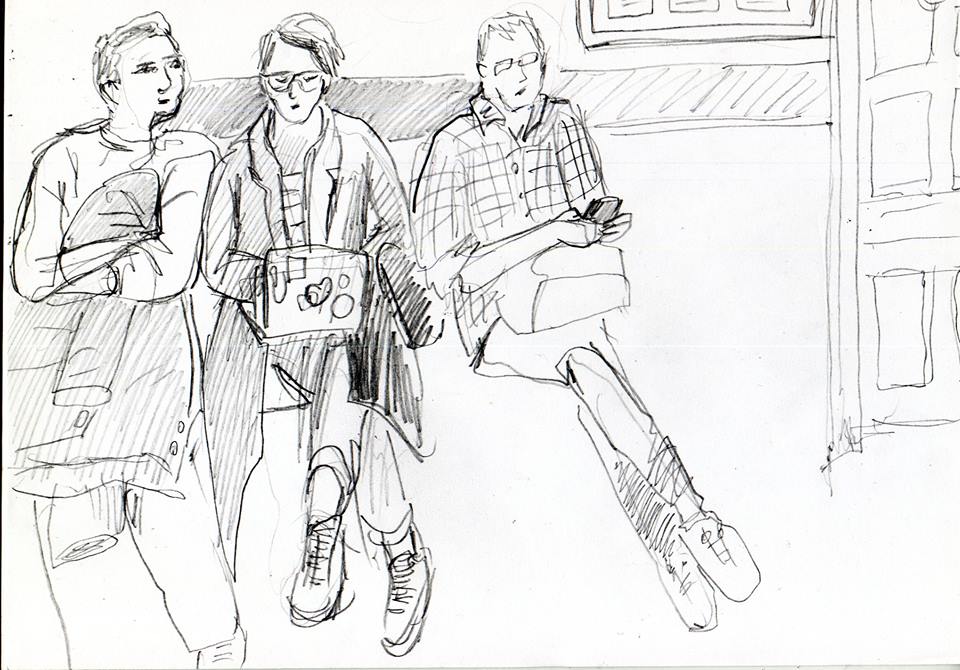
Many people left the courthouse to have a smoke and eat lunch, so they could come back later.
I left altogether because my brain had completely melted.
I was home when I read that, at 3:46 p.m., the court had ruled Viktor be kept in police custody until June 22.
I felt a sharp pang of the suffocating absurdity that nearly everyone has accepted. But no, I hope they haven’t.
Translated by the Russian Reader. Thanks to Ms. Tereshkin for her kind permission to reproduce her drawing and publish a translation of her text here. All images © Anna Tereshkina, 2018. If you have not heard about the Penza-Petersburg “terrorism” case, you need to read the following articles and spread the word to friends, comrades, and journalists.
- “Ping, Ping, Ping: The Remand Extension Hearing of the Penza ‘Terrorists,'” 20 March 2018
- “Tortured Petersburg Antifascist Viktor Filinkov Transferred to Remand Prison in Leningrad Region,” 17 March 2018
- “Svyatoslav Rechkalov: ‘They Proceeded to Pull Down My Trousers, Threatening to Shock Me in the Groin,’” 15 March 2018
- “They Jump on Anything That Moves, Part 3: The Case of the New Greatness Movement,” 15 March 2018
- “The Horrorshow Continues: Svyatoslav Rechkalov Tortured in Moscow,” 15 March 2018
- “The Rowdies Have to Be Apprehended Legally, So We Can Have a Celebration in the City on March 18, not Bedlam,” 15 March 2018
- “Ilya Kapustin: ‘When the Stamp Thudded in My Passport, It Was Like a Huge Weight Had Been Lifted from My Shoulders,’” 13 March 2018
- “Your Husband Safely Made the Flight to Minsk after We Abducted Him in Petersburg,” 2 March 2018
- “‘FSB Officers Always Get Their Way!’” 28 February 2018
- ‘The Case of the Anarchists: Disappearances, Torture, Frame-Up (11 AM, February 15, 2018, Moscow),” 14 February 2018
- “The Strange Investigation of a Strange Subway Attack,” 12 February 2018
- “Arrested Penza Antifascists Talk about Torture in Remand Prison,” 10 February 2018
- “Solidarity with Persecuted Russian Antifascists and Anarchists in NYC and Minneapolis,” 7 February 2018
- “Ilya Kapustin: ‘They Said They Could Break My Legs and Dump Me in the Woods,’” 31 January 2018
- “The Penza ‘Terrorism’ Case,” 30 January 2018
- “Breaking Bad with the FSB,” 29 January 2018
- “How ‘Stability’ Has Really Been Achieved in Russia,” 29 January 2018
 The turnout (yavka) for last September’s gubernatorial election in Petersburg was a record low of thirty percent. Less than a year later (at the height of summer, in the midst of a pandemic), the turnout for a meaningless “referendum” on amendments to the Russian constitution (which had already been ratified by both houses of parliament and signed into law by Putin) drew a record high turnout of 74% in Petersburg, according to local political blog Rotunda. Graphic courtesy of Fontanka.ru
The turnout (yavka) for last September’s gubernatorial election in Petersburg was a record low of thirty percent. Less than a year later (at the height of summer, in the midst of a pandemic), the turnout for a meaningless “referendum” on amendments to the Russian constitution (which had already been ratified by both houses of parliament and signed into law by Putin) drew a record high turnout of 74% in Petersburg, according to local political blog Rotunda. Graphic courtesy of Fontanka.ru Metropolitan Varsofonius and his crew. Photo by Andrei Petrov. Courtesy of the St. Petersburg Archdiocese of the Russian Orthodox Church and Fontanka.ru
Metropolitan Varsofonius and his crew. Photo by Andrei Petrov. Courtesy of the St. Petersburg Archdiocese of the Russian Orthodox Church and Fontanka.ru
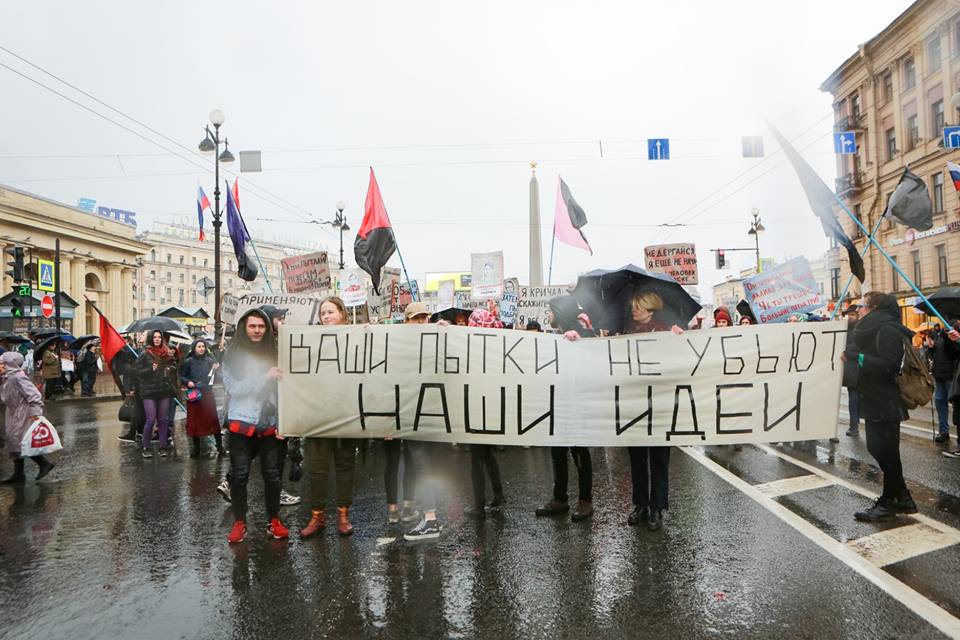 “Your torture won’t kill our ideas.” Anarchists and antifascists march down Nevsky Prospect in Petersburg on May Day 2018
“Your torture won’t kill our ideas.” Anarchists and antifascists march down Nevsky Prospect in Petersburg on May Day 2018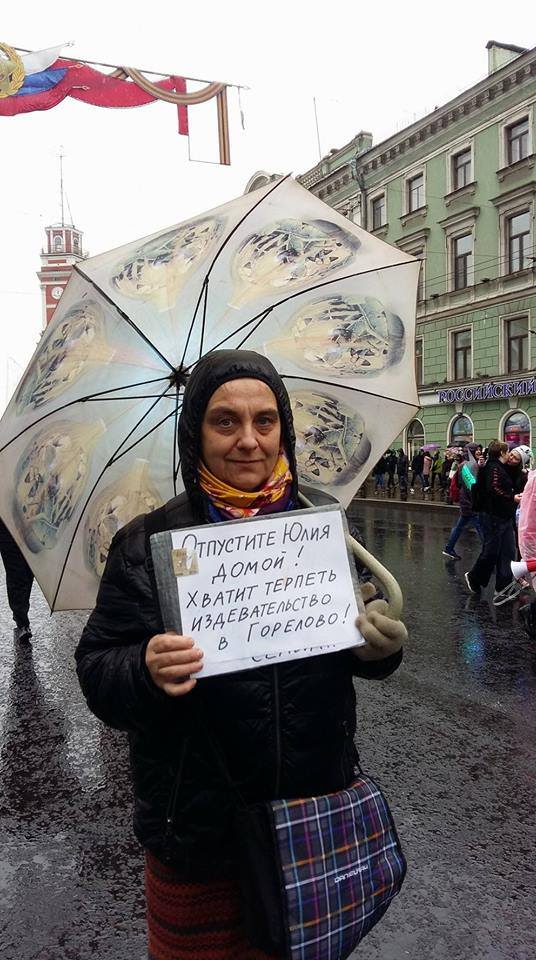
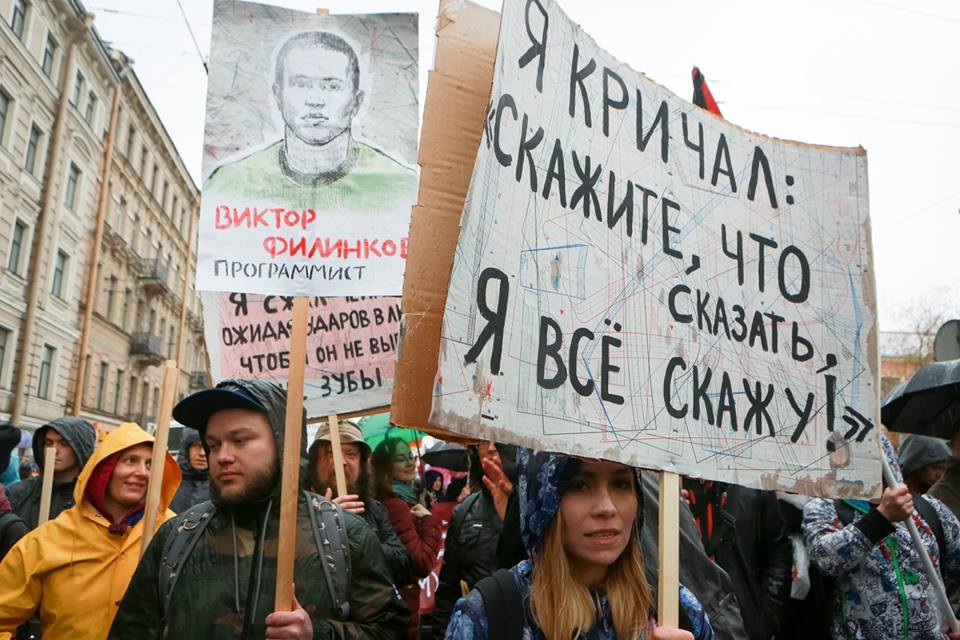 “Viktor Filinkov, programmer.” || “I screamed, ‘Tell me what to say. I’ll say anything!'” Anarchist and antifascists at 2018 May Day demo in Petersburg
“Viktor Filinkov, programmer.” || “I screamed, ‘Tell me what to say. I’ll say anything!'” Anarchist and antifascists at 2018 May Day demo in Petersburg







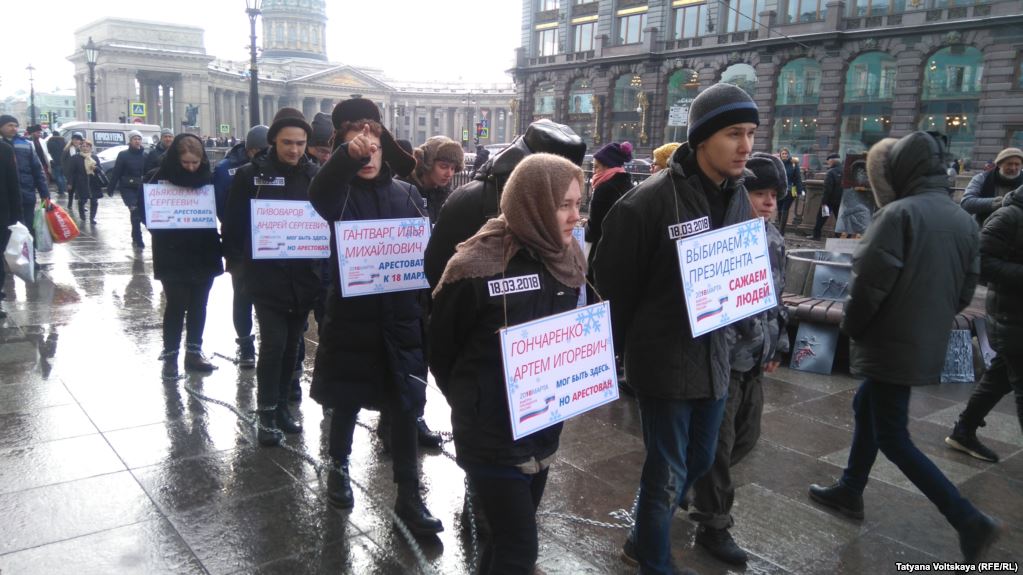 The political performance “Clanking Chains,” March 11, 2018, Petersburg. Photo by Tatyana Voltskaya. Courtesy of
The political performance “Clanking Chains,” March 11, 2018, Petersburg. Photo by Tatyana Voltskaya. Courtesy of 
